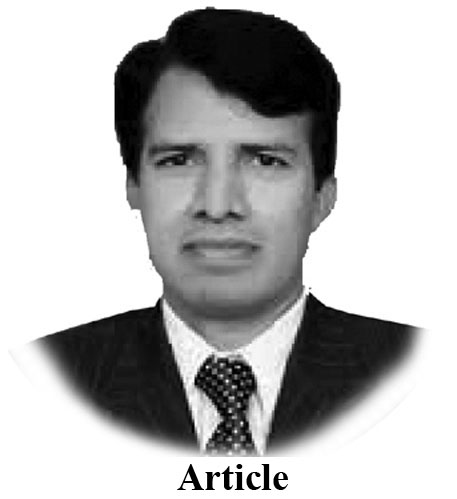Dr Muhammad Khan
OXFORD University Press has recently published a book, entitled; “Majoritarian State: How Hindu Nationalism is Changing India. The book is an account of rise of Hindu nationalism in India rather Indian nationalism over the last century. Indeed, it describes the rise of Hindutva ideology both at the level of Indian state and Indian society simultaneously, reached to its climax with Narendra Modi, taking over the power at New Delhi in 2014. The book is written and edited by senior authentic and reputed authors like Angana P. Chatterji, Thomas Blom Hansen and Christophe Jaffrelot, all had extensively researched and written o this unusual rise of extreme mindset in a country having 1.3 billion population like a huge explosive factory. The book, indeed, is a message not only for Indian minorities and South Asian neighbours of India, but a warning to entire international community, since Indian diaspora has reached and stretched all over the world. The Hindu ideology, rather a national ideology, indeed an expansionist mindset emerged in India over the past few decades, has become a threat for global peace at large. It is in the context that there is a growing Indian diaspora all over the world, holding key governmental positions in most of the European countries, United Kingdom, United States, Scandinavian States, Middle East, Africa and elsewhere in the world. Besides Government functionaries, Indian diaspora and expatriates are deeply involved in running the educational system; schools, colleges and universities in most of the countries across the globe.
While being the expatriates, the Indian Hindu communities have been found as the most submissive and soft in their behaviour for winning the global hearts and mind, international acceptability and worldwide recognition. Indeed, this is the first stage of Hindutva ideology, outside Indian borders, where they have to be extra nice and docile in order to get into the next phase of taking control over the system. Indeed, it is a gradual ascendancy and control over the system systematically (like slow poisoning). In the context of South Asia, it can be tit-for-tat movement, the way East India Company has entered into the subcontinent, paving way for prolonged British Colonialism in this part of the world. However, unlike the hard power of colonial power, Hindutva strategists believe in ascendancy through soft power, transforming into hard power, after reaching the apex, the way Modi’s BJP is doing in India. As the authors specified, “The vision of a Hindu majoritarian polity held by the Rashtriya Swayamsevak Sangh (RSS) and the BJP combines cultural nationalism and political strategies aiming at flagrant social dominance by the upper castes, rapid economic development, cultural conservatism, intensified misogyny, and a firm grip on the instruments of state power.” This all is related to seizing power within India, through the domination of Hindutva, a narrow minded ideology with a domination of upper Hindu class, all over India and exploit the minorities and even the lower caste Hindus.
Hindutva is Hindu nationalism, coined and nurtured by Vinayak Damodar Savarkar in 1923 and championed by RSS, Vishva Hindu Parishad (VHP) and Hindu Sena. The impartial scholars call this as a fascist outfit like Nazi regime of Hitler and Fascist regime of Mussolini, adhering to a concept of homogenised majority and cultural hegemony. Hindutva ideology has a lot of resemblance with the Zionist ideology of the State of Israel. This ideology has unleashed a reign of terror in West Asia (Middle East), since 1948. The Zionist ideology (expansionist in nature and cruel in practice) was founded and promoted by Theodore Herzl in the late 19th Century (1897), giving a vision of a Jewish State and its current state of expansionist designs. Contrary to the domestic Indian policies, as devised and implemented by successive Indian rulers, the followers of the Chanakya (Kau?ilya) track a docile policy globally for attaining the moral ascendancy before reaching the peak. Indeed, in the garb of secularism and democracy within India, the followers of Hindutva, gradually reached to power at Gujarat initially and New Delhi subsequently. Indeed, it is third ascent of the BJP to power in New Delhi; A.B. Vajpayee (1998–2004), Narendra Modi 2014-2019 and come back of Modi in 2019. Indeed, with a comparative humble start by AB Vajpayee, Modi, the lifetime member of RSS, consolidated power throughout India with Hindutva ideology from 2014 to 2019. Immediately after taking over for the second term in May 2019, he has started taking extreme steps to pursue the ultimate agenda; Kashmir becoming the first prey to this extremism.
Indeed, the founder of Hindutva (RSS and BJP) had based their movement and ideology on these fascist and expansionist lines, which is being implemented with a favourable regional and global environment; with BJP at power in India and a staunch support from Zionism of the State of Israel. Besides, all is being supported by the current superpower and most of global community, having great gestures for both Hindutva-led Government in India and Zionist-led Government in Israel. As the scholars noted, there are four ‘isms’; populism, nationalism, authoritarianism and majoritarianism, all resonate with the notion of ‘Sultanism’, which RSS and BJP are pursuing in India. It “combines two further elements: the implementation of a more unvarnished pro-corporate and pro-upper caste compound of policies, threatening the minorities within India and expansionism outside Indian border. A collation of Hindutva and Zionism is emerging as a new global threat; both are based on narrow minded ideologies and expansionist designs where other religions, ideologies and communities are intolerable. Those supporting them today must realize the fallout of this undesired support tomorrow, since they have no place for those, not following their ideologies.
— The writer, a retired Brig, is Professor of Politics and International Relations at International Islamic University, Islamabad.










